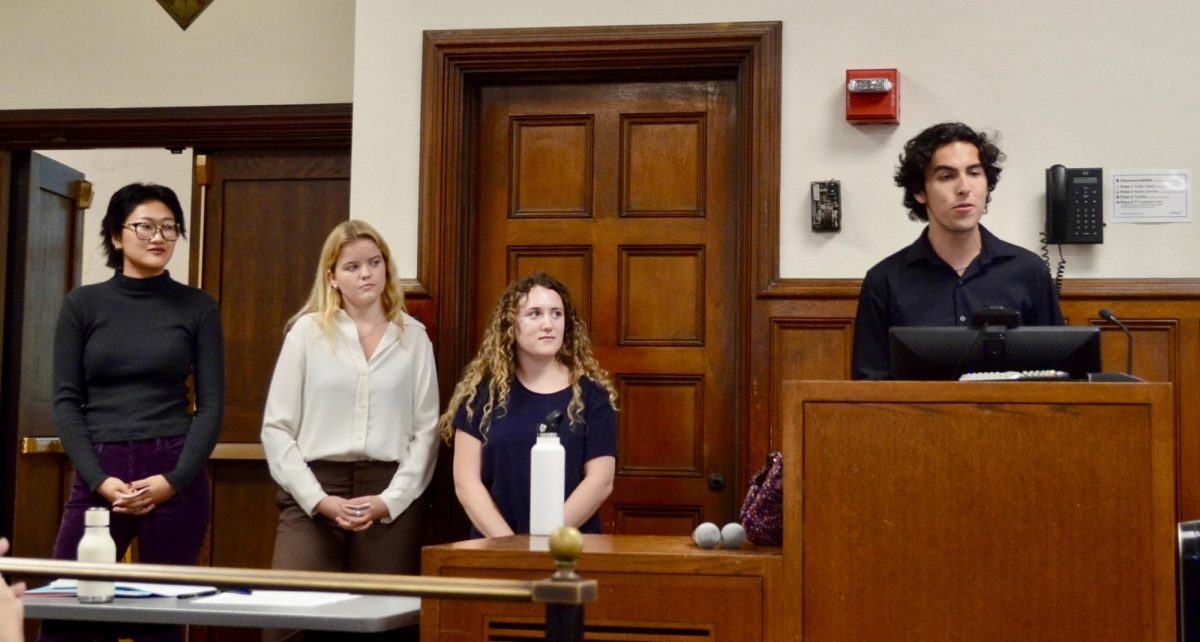By KATIE MEYER
ASSISTANT NEWS EDITOR

For most, Collins Hall is the building that comfortably houses Rose Hill’s Philosophy Department, the Blackbox Theater and Collins Auditorium, where most theatrical productions on campus are performed. But for those few who are bound by a wheelchair or other physical handicap, Collins Hall is one of several buildings at Rose Hill that are either fully or partially inaccessible. For example, even the side ramp to the first floor, which might have allowed limited access to the building, is rendered largely ineffective by a flight of stairs to the front door.
Discussions of improvement have been stalled for years even though students have been vocal about their disappointment at being unable to attend certain on-campus shows; little progress was ever made in making Collins’s facilities more accessible. Recently, however, a group of students in Rose Hill’s United Student Government (USG) have come forward with a resolution.
“[We are] disappointed that the inaccessibility of Collins Hall excludes some members of the Fordham community from academic and cultural opportunities, an inequality that directly contradicts the Jesuit tenet of cura personalis,” the resolution says.
Donald Borenstein, FCRH ’13 and president of FCRH ’13, Matt Lindblad, FCRH ’13 and secretary/treasurer of FCRH ’13 and Sarah Skrobala, FCRH ’15 and vice president of FCRH ’15, worked together to draft the document.
“We decided the only acceptable course of action with this resolution would be to urge [administrators] to make the renovations we feel are entirely necessary to Collins Hall,” Borenstein said in an interview.
The resolution calls for Fordham’s administration to “greatly prioritize the renovation of Collins Hall for full accessibility among other capital expenditures on the Rose Hill campus.”
The document also asks administrators to disclose a timetable for renovations and to refrain from renovating other university spaces that are not fully accessible until after the work on Collins Hall is completed.
Also included in the resolution is a request that student groups find other venues for productions and events.
“[We urge student groups] to consider the availability of the Leonard Theater or reserving portable stages, lighting and sound systems for use in spaces such as the McGinley Ballroom as a substitution for the inaccessible Collins Hall,” the resolution says.
Aileen Reynolds, FCRH ’14 and executive vice president of USG, said that this resolution will be included in USG’s annual midyear report, which will be released next week.
“USG is dedicated to representing and advocating for our peers,” Reynolds said in a statement of support via text message on Tuesday. “Accessibility of our campus is an important issue that directly affects members of our community.”
USG will discuss the resolution with Marco Valera, vice president of facilities at their meeting on Feb. 21, according to Reynolds.
In researching, Borenstein, Linblad and Skrobala looked at universities similar to Fordham and found that none of the campuses they looked at had inaccessibility issues, according to Borenstein.
In most cases, the Americans with Disabilities Act of 1990 (ADA) makes it illegal for buildings to be inaccessible for the disabled. Collins Hall, however, escapes those regulations because was built in 1904 — making it one of the oldest historic buildings on campus.
This has caused USG to make an ethical appeal to Fordham’s administration in their resolution. While recognizing that significant improvements to Collins Hall will require a lot of time, dedication and money, the resolution points out that every Fordham student deserves equal access to all facilities.
There has yet to be much feedback regarding the resolution, but Bornstein said that meetings with administrators so far have been “mostly positive.”
“This exposure will hopefully raise awareness among Fordham’s administration that this issue is important to students,” Reynolds said.
“Only time will tell,” Bornstein said, “and we hope to do the best we can to make the case for Fordham placing a serious priority on campus accessibility at Rose Hill.”
“A fully accessible Collins Hall would provide an additional event venue for the university.”







































































































































































































